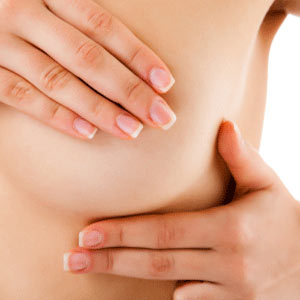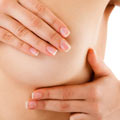Description of the test
Breast self-exams (BSE) used to be routinely recommended as part of screening for the early detection of breast cancer. However, research has shown that routine BSE does not decrease the chances of dying from breast cancer and that it can actually increase the number of unnecessary biopsies. Current breast cancer screening guidelines, which apply to women aged 40 to 74 with an average risk of breast cancer, do not recommend routine BSE.
Currently, the emphasis has shifted to breast awareness, or being aware of the usual look and feel of your breasts.
Breast awareness is different from a clinical breast exam, which is performed by a health care professional. A clinical breast exam consists of using the hand to feel the tissue of the breast and the surrounding area to look for any bumps or lumps. Current breast cancer screening guidelines no longer recommend routine clinical breast exams for women 40 to 74 years of age who have an average risk for breast cancer. Ask your doctor if you should have a clinical breast exam.
How often should the test be performed?
Current breast cancer screening guidelines and the Canadian Cancer Society no longer recommend routine monthly BSEs. However, the Canadian Cancer Society does recommend that women become familiar with the look and feel of their breasts and report any changes to their doctor.
Why is this test performed?
Earlier, it was thought that BSEs would help to detect and treat breast cancer earlier and save lives. However, research has not found this to be beneficial. Breast awareness can be used to become familiar with the usual look and feel of your breasts so that you can detect any changes.
Are there any risks and precautions?
There is no risk of direct side effects or complications with this test.
Some indirect risks can include:
- anxiety while performing the exam and if a lump is found
- unnecessary biopsies
What happens during the test?
Breast awareness involves getting familiar with the usual look and feel of your breast tissue. It is important to be aware that breast tissue actually extends beyond the areas that we would normally think of as "the breast." When performing breast awareness, don’t forget to check under the armpits and all the way up to the collarbone. Take note of your skin’s colour and feel, the texture of your breasts, and the appearance of the nipples. Looking at your breasts in a mirror also makes it easier to discover changes in appearance (e.g., size, shape, texture). Keep in mind that before your menstrual period, your breasts may become tender or lumpy.
How should I prepare for this test?
This test does not require preparation. Performing the test when your breasts are not tender or swollen makes it more comfortable for many women.
What can I expect after the test?
If you notice any changes in the breast tissue or surrounding areas, speak with your doctor.
Results
If you are suspicious of a change you notice in your breasts, talk to your doctor. It may be nothing to worry about. However, it is important to get the advice of a health care professional. Some changes you should consider abnormal include:
- changes in the skin's colour or feel (e.g., smooth skin becoming wrinkled, usual texture feeling thicker)
- nipple changes, including puckering or sinking into the breast tissue
- bloody discharge from the nipple
- a lump of any size under the skin
- painful or tender areas
All material copyright MediResource Inc. 1996 – 2024. Terms and conditions of use. The contents herein are for informational purposes only. Always seek the advice of your physician or other qualified health provider with any questions you may have regarding a medical condition. Source: www.medbroadcast.com/procedure/getprocedure/Breast-Awareness

Example of two methods for performing a breast self-exam, the grid and circular methods, courtesy of the Canadian Cancer Society.






